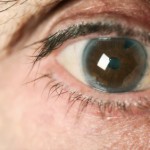I recently found an article in JAMA, the Journal of the American Medical Association, that struck home. I've had both eyes surgically redone, i.e., had cataract surgery on first my left eye, then my right. The first hint was the inability to correct my vision to 20/20. Then I started noting oncoming lights had halos. I got mildly uncomfortable driving at night, but had no major difficulty until some time after my first laser operation. Then I started to note that street signs were hard to read.
Our ophthalmologist at the time reassured me that having a cataract was common and that the surgery would be very helpful.
It certainly was, although my right eye required a brief in-office touch-up after a few months.
Now it's my wife's turn. She's always had incredible vision; even after needing bifocal and then trifocal glasses her far vision corrected to better than 20/20. She had her left eye's cataract done about two years ago and was very happy with the result.
Then about three months ago she started having problems with driving at night. It's time for the right eye to have its turn. I took over the night driving chores and we had no difficulty on our 30-day, 4,000 mile drive to the far northwest and then across British Columbia and most of Alberta. She'll see our new ophthalmologist in a few days.
There's lots of background information on the National Eye Institute's (part of the NIH) website (updated from when I first wrote this post) https://nei.nih.gov/health/cataract and a similar website for the UK sent me by a British reader: http://www.lasereyesurgeryhub.co.uk/cataracts/ I'll go through the basics: First a cataract is a change in the lens, the clear part in the front of your eye that you use to focus an image or light on the retina in the back much like you focus a camera. It can develop in one eye or both; roughly 50% of us will have to deal with at least one cataract if we live long enough, as the majority of cataracts occur as part of aging. You may have small cataracts when you are in your 40s and 50s without noticing significant visual loss.
The University of Maryland has a website with cataract risk factors; besides age as the primary risk factor, you may be more prone to developing a cataract if you are diabetic (either type 1 and 2), have excessive sun exposure, are African American, smoke (a pack a day doubles your risk), drink heavily, have a disease treated chronically with corticosteroids (AKA steroids), suffer a physical injury to an eye or even if you are nearsighted. Researchers think a diet rich in antioxidants (e.g., green,leafy vegetables) may help prevent cataracts.
If you have a cataract, your vision will not be as sharp and you may notice things seen change color to a brownish shade
Surgery is the most common treatment for significant cataracts and is regarded as a safe and effective procedure with 90% of patients experiencing improved vision post operatively according to the National Eye Institute.
So what is this leading up to? The JAMA article dated August 1, 2012, is titled "Risk of Fractures Following Cataract Surgery in Medicare Beneficiaries. I was initially puzzled by this, but as I read the article, the actual title, in my opinion, should have been "Reduced Risk of Hip Fractures ..." Clear vision helps prevent falls and in a 5% random sample of Medicare beneficiaries (that meant 1,110,640), 410,809 had cataract surgery. When compared to those who did not, patients undergoing such an operation had a 16% decreased incidence of hip fracture in the following year.
I'm pleased with the results of my own cataract removal surgery. Are you about to have such a procedure?



